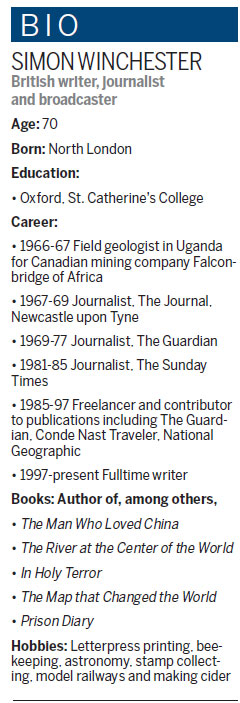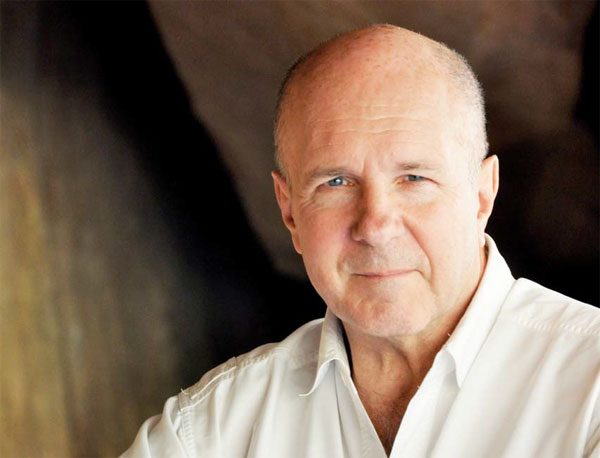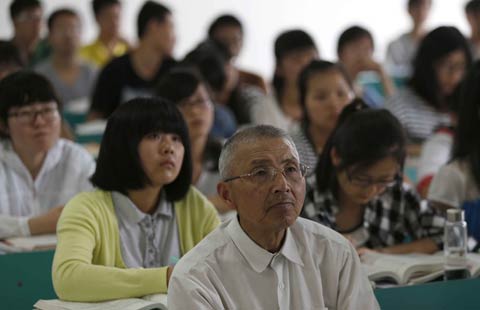The man who also loves China
By Hu Haiyan ( China Daily Europe ) Updated: 2014-06-27 07:35:49
|
Simon Winchester says he is struck by the huge changes in China in recent years. Setsuko Winchester / For China Daily |
British writer Simon winchester fell under country's spell 30 years ago, and that passion endures
China could one day have as great and potent a presence in the world's oceans as the United States does today, says Simon Winchester, the veteran British writer, journalist and broadcaster.
"No one, least of all the United States, can doubt the growing and very visible importance of China in all of the western Pacific," he says.
Winchester, 70, who has written 26 books, some of which have appeared on The New York Times bestseller list, says it is a matter of geographic logic that the world's most populous country should wield influence west of the international dateline.
"There are some who cannot imagine this influence ever extending to the ocean's east to the coast of Canada and Chile, Peru and Panama, and of course to the littoral of the US itself. But I can entirely imagine this though perhaps not in my lifetime."
Winchester is now working on another project, a trilogy about the Pacific Ocean.

"My current book will necessarily involve China, because of her growing interest in and influence on the Pacific."
He is unsure what the implications for the geopolitical balance of power may be or may be perceived to be, he says, adding that it depends largely on what China's ambitions are.
"Certainly Chinese history would suggest a peaceful intent, and I would hope most nations would accept and welcome such an approach. To have other aims would be most troublesome."
On current conflicts in the Asia-Pacific region, "discussion, negotiation and binding third-party arbitration would seem the best solution", he says.
"The League of Nations arbitrated the Aland Islands dispute; the Vatican arbitrated the Beagle Channel dispute; some neutral party, Norway, perhaps, or Canada might take on the current island arguments between China and her most vexed neighbors."
From early in his journalistic career, Winchester was a globetrotter, and his traveling days are still far from over.
He graduated from St. Catherine's College, Oxford, with a geology degree in 1966. He then worked for a Canadian mining company in Uganda, and while there the following year, after reading a copy of Coronation Everest by the journalist Jan Morris, decided that he, too, wanted to be a journalist.
The book, Winchester said in a review many years later, "offers a breathtakingly intimate evocation of the most famous of all mountaineering exploits and of perhaps the last great old-fashioned Fleet Street scoop".
After being rebuffed in his attempts to find work with various newspapers because of a lack of experience, he eventually landed a job as a junior reporter with The Journal, in Newcastle upon Tyne, northern England. Since then he has worked on the staff of or has been a freelancer for many newspapers and magazines, including The Guardian.
While working for it, the events he covered included the Bloody Sunday killings in Northern Ireland in 1972 in which British Army soldiers fired on protesters and bystanders resulting in the deaths of 14 people, and the Watergate scandal in the US that ended with the resignation of President Richard Nixon in 1974.
While working as a journalist he began writing books, which have covered areas including geography, history, politics and travel.
His first book, In Holy Terror, published in 1975, depicts his experience during the Troubles in Northern Ireland.
When his book The Professor and the Madman, about the making of the Oxford English Dictionary, was published in 1998, it appeared on The New York Times bestseller list.
In writing travel books, Winchester has employed the narrative non-fiction form he used in The Professor and the Madman several times, giving birth to several bestsellers, such as The Map that Changed the World, which looked at the work of the geologist William Smith, which was published in 2001.
He was appointed Officer of the Order of the British Empire in 2006, in recognition of his services to journalism and literature.
In 1982, when he worked as chief foreign feature writer for The Sunday Times, he was held in prison in Tierra del Fuego, Argentina, for about three months when the Falkland Islands were invaded by Argentine forces. "Every experience counts," he says. His third book, Prison Diary, recounts his time in custody.
His most well-known book among Chinese is probably The Man Who Loved China, published in 2008, about the life of the Cambridge scholar Joseph Needham, who helped expose China to the Western world.
When Winchester wrote the book he used Chongqing, Sichuan province, as a base and traveled to places Needham had visited in the 1940s, including Dunhuang, Gansu province, and Xiamen, Fujian province.
Some academics argue that many Chinese writers well known in the West live outside China and wrote their books long ago, and that this hinders Westerners in understanding China, but Winchester thinks too much is made of the academic view of China.
"I am a great believer in a boots-on-the-ground approach to recording life in China, and feel more academics should leave their ivory towers and head for the streets and the villages."
His first visit to China was a little more than 30 years ago as a reporter when the then British foreign secretary, Geoffrey Howe, traveled to the country to take part in preliminary talks about the future of Hong Kong.
"I was struck back then by the dusty quietness of the city we then called Peking," Winchester says. "Of the tens of thousands of cyclists, all pedaling as one along the great streets of the capital; and the monochrome nature of the city gray skies and blue clothes."
Two friends working in Beijing as translators and interpreters, Yang Xiangyi and his wife Gladys Yang, introduced him to hutong life and some of the hidden delights of the capital.
He soon fell under China's spell, and it is a passion that endures to this day, he says.
For 12 years from 1985 he worked in Hong Kong and in those years he visited every corner of China, including Mohe in Heilongjiang province, Weihai in Shandong, Hainan island and the Kashgar region of Xinjiang Uygur autonomous region, he says.
In 1997 he traveled the length of the Yangtze River, from Shanghai to Gelan Dandong in Tibet autonomous region, for a book called The River at the Center of the World, published that year, and which, he says, is the book he has drawn the most satisfaction from in writing.
Like many others, he is struck by the huge changes in China in recent years.
"The changes in modern China are obvious, and very fast maybe too fast for the comfort of all. Were I to use three words to describe my feelings about today's China, I would say: headstrong, forgetful and careless."
Winchester, who now lives in the US, plans to visit China in August researching his current book on the Pacific Ocean, and he says he plans to write more books on China.
His next book will probably be about the history of precision, and on mankind's adoration of things that are precise, such as machines.
"China, by contrast, still has some residual veneration for imprecise materials - bamboo, for example. I am interested in the contrast between societies that have become slaves to precision, and to those that still have some respect for the fuzzy imprecisions of nature."
He loves Chinese poetry, classical and contemporary, he says, and like-minded young people in China who can capably translate poetry into English would be providing a worthy service in making the poetry available to a wider audience.
Winchester says that when he is writing a book he usually does it in six-month stretches. He gets up at 5:30 am, edits until 8 am, has breakfast until 9 am, writes until 4 pm, runs or cycles between 4 pm and 6 pm, prepares for the next day's work until 8 pm, has dinner at 8 pm and goes to bed at 11 pm.
For anyone keen to emulate him, he says: "As a writer you will see amazing things, meet remarkable people and have unforgettable experiences. Convey this to your readers, and never become world-weary.
"Try to regard what is a very noble profession as your sacred duty. Be persistent. Never become discouraged."
(China Daily European Weekly?06/27/2014 page32)
|
|
|
|
|
|
|
|
European Weekly
 We will not give up search, Li vows
We will not give up search, Li vows
International hunt for missing airliner continues after fruitless six-day search























